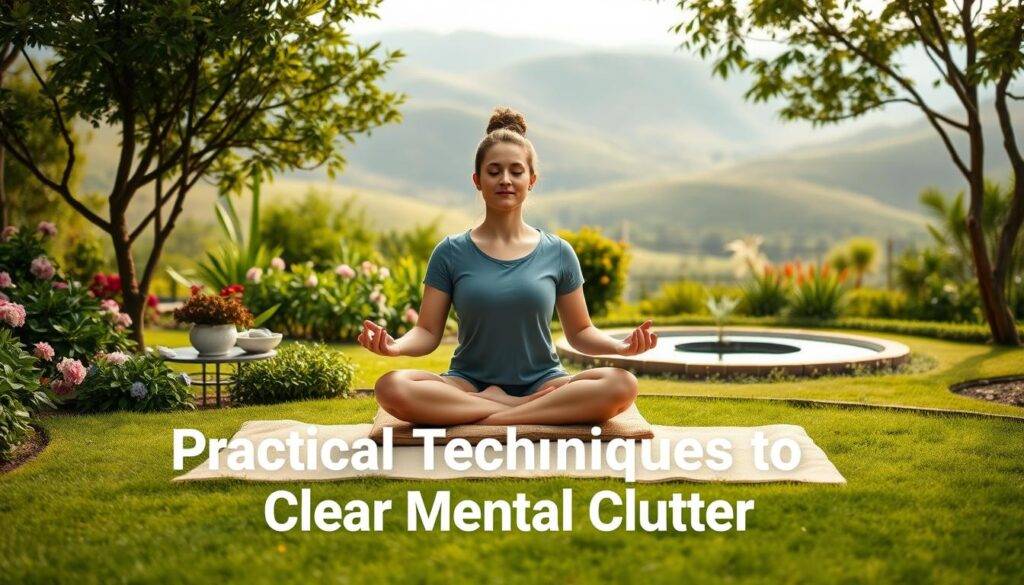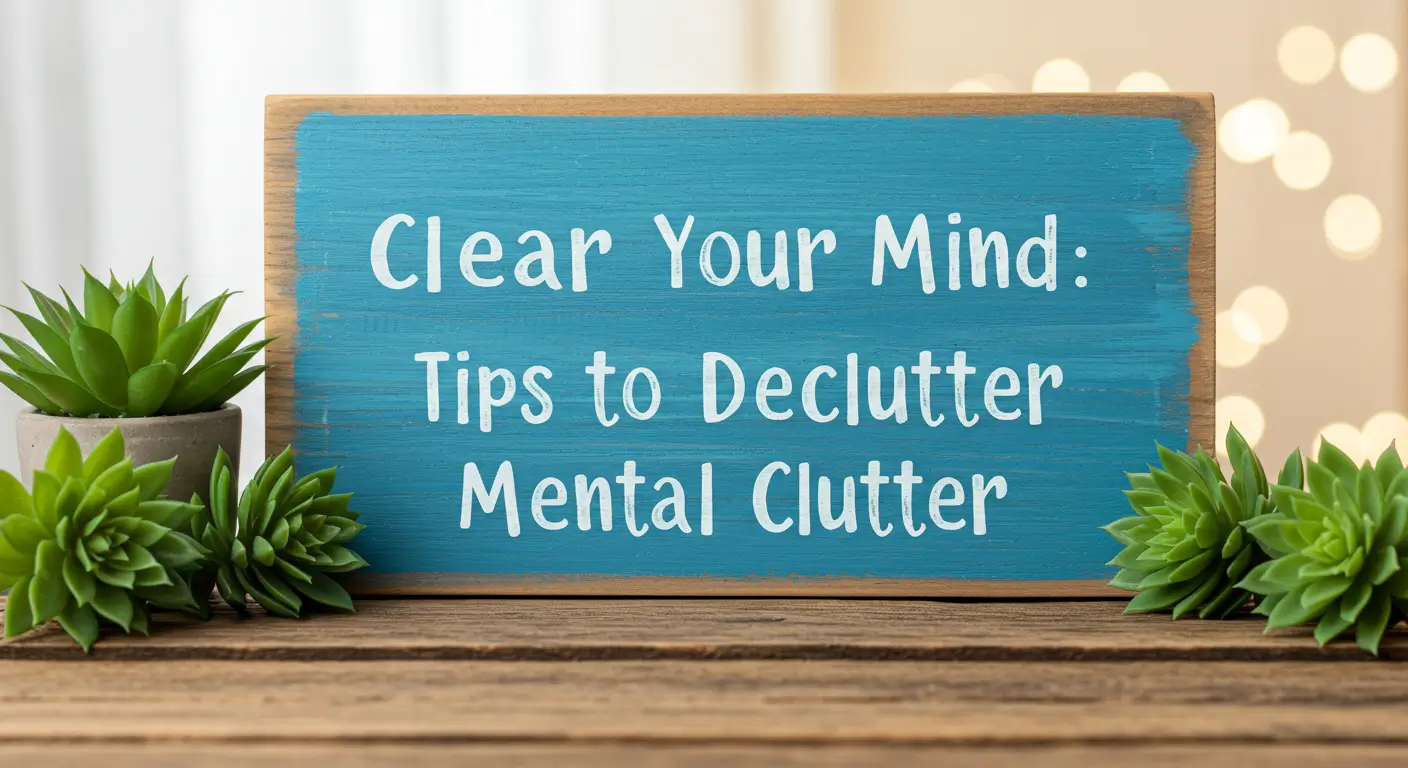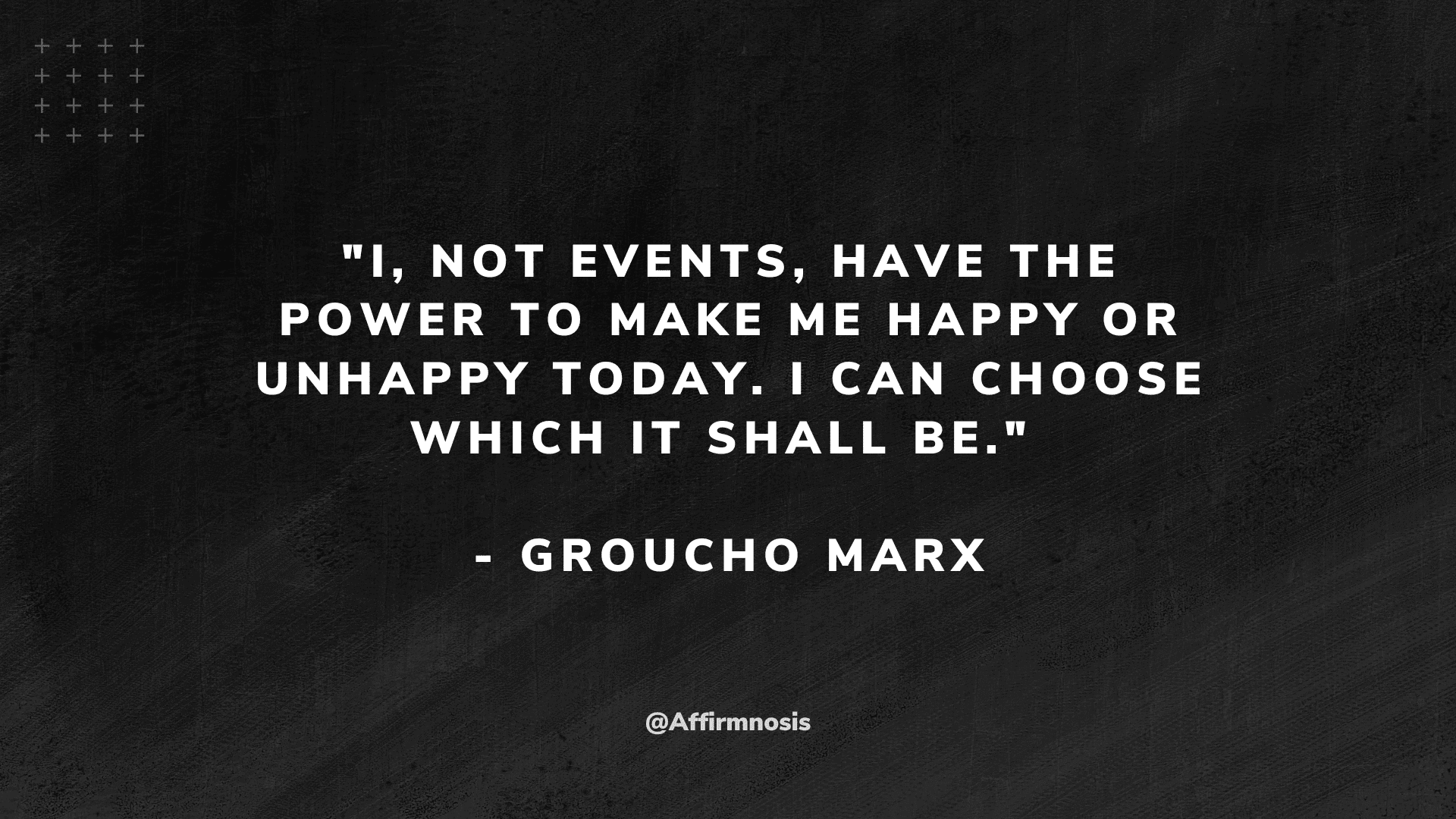“The mind is everything; what you think, you become.” – Buddha
In today’s fast-paced world, our minds are constantly bombarded with information, notifications, and news, leading to a cluttered mental space. This clutter can manifest in difficulty focusing on projects, remembering details, and getting quality sleep, ultimately affecting our overall well-being and daily life.
As we navigate this information-saturated world, it’s essential to acknowledge the importance of mental decluttering for improved productivity, creativity, and peace of mind. By learning to manage our thoughts and prioritize our well-being, we can regain control over our day and improve our overall quality of life.
This article will provide practical strategies to help you clear your mind and maintain mental clarity in a world that often seems designed to distract us.
Key Takeaways
- Understand the concept of mental clutter and its impact on daily life
- Learn practical strategies to declutter your mind and improve focus
- Discover techniques to manage information overload and reduce stress
- Improve productivity and creativity by maintaining mental clarity
- Develop a regular practice to sustain a clear and peaceful mind
Understanding Mental Clutter and Its Impact
Mental clutter, much like physical clutter, can have a significant impact on our well-being. It refers to the accumulation of unprocessed thoughts, information, and emotional responses that overwhelm the mind.
Signs Your Mind Needs Decluttering
Identifying the signs of mental clutter is the first step toward addressing it. Common indicators include forgetfulness, difficulty concentrating, and sleep disturbances. When mental fatigue takes hold, it becomes challenging to focus and take action, leading to a growing to-do list and feelings of distraction.
Some people may experience anxiety or stress due to the constant mental activity and information overload. Recognizing these signs is crucial, as it allows individuals to take the necessary steps toward decluttering their minds.

How Mental Clutter Affects Daily Life
Mental clutter can significantly impact daily life, affecting productivity, decision-making abilities, and creative thinking. The brain’s limited capacity for processing information means that excessive mental clutter can lead to decreased cognitive function.
Furthermore, the physiological stress response triggered by information overload can have long-term effects on emotional well-being, increasing feelings of anxiety and stress. By understanding the impact of mental clutter, individuals can take proactive steps to mitigate its effects and improve their overall quality of life.
The Connection Between Physical and Mental Space
The state of our physical environment has a profound impact on our mental well-being. Research has consistently shown that cluttered spaces can lead to increased stress levels, reduced focus, and decreased productivity. In contrast, a well-organized and clutter-free environment supports mental clarity and overall well-being.

How Your Environment Influences Your Mind
Our physical surroundings directly influence our cognitive processing and emotional state. Studies have found that physical clutter is linked to heightened anxiety in both children and adults. Cluttered spaces can increase cortisol levels, making it difficult to focus and relax. On the other hand, a decluttered space promotes a sense of calm and supports overall productivity. When we are surrounded by clutter, our minds can feel overwhelmed, making it challenging to concentrate on tasks.
Creating designated spaces for different activities can help compartmentalize thoughts and reduce mental clutter. For instance, having a dedicated workspace can help separate work-related tasks from personal life, reducing the feeling of being constantly “on the clock.”
Simple Steps to Declutter Your Physical Space
Decluttering your physical space doesn’t require perfect organization; rather, it involves creating an intentional arrangement of your surroundings. To start, identify areas that feel cluttered or overwhelming and take small steps to tidy them up. Begin with one area at a time, sorting items into categories: keep, donate, and discard. As you declutter, focus on minimizing visual distractions, which can significantly reduce cognitive load.
One effective step is to create a “step” towards decluttering by starting with a single task, like clearing off a single shelf or sorting through a cluttered drawer. As you progress, you’ll find that the process of physically decluttering can serve as a metaphor and practice for mental decluttering, helping you to clear your mind and focus on what’s important in your life.
Practical Techniques to Clear Mental Clutter
Mental clutter can be overwhelming, but there are several techniques that can help declutter the mind and enhance mental well-being. By incorporating these strategies into daily life, individuals can improve their ability to focus, reduce stress, and enhance overall mental clarity.
Brain Dumps and To-Do Lists
One effective method for clearing mental clutter is the brain dump technique. This involves writing down all thoughts, tasks, and ideas without worrying about their order or importance. By externalizing these thoughts, individuals can reduce cognitive load and gain a clearer perspective on their tasks and priorities. Creating a structured to-do list from the brain dump helps prioritize tasks and creates a sense of control over one’s workload.
For instance, when faced with multiple tasks, grabbing a notebook and pencil to list everything can be incredibly liberating. This process not only helps in organizing tasks but also in identifying priorities. The act of writing down tasks and ideas helps to externalize thoughts and reduce the mental effort required to remember them.
| Technique | Description | Benefits |
|---|---|---|
| Brain Dump | Writing down all thoughts and tasks without order or priority | Reduces cognitive load, clarifies tasks |
| To-Do Lists | Creating structured lists from brain dumps to prioritize tasks | Enhances task management, creates a sense of control |
Journaling for Mental Clarity
Journaling is another therapeutic practice that aids in processing emotions and clarifying thinking. By forcing individuals to slow down and articulate their feelings, journaling provides a valuable outlet for emotions. Different journaling techniques, such as stream of consciousness, gratitude journaling, and structured reflection, offer various ways to achieve mental clarity.
For example, stream of consciousness journaling allows individuals to freely express their thoughts and feelings without editing or censoring themselves. This can be particularly helpful in uncovering underlying concerns or emotions that may be contributing to mental clutter.
Talking It Out: The Power of Verbal Processing
Verbal processing is a powerful tool for gaining clarity on complex thoughts and emotions. Talking through problems with a trusted listener can provide new insights and perspectives, helping to declutter the mind. The act of verbalizing thoughts and feelings can help individuals process and understand their emotions better.
Finding a safe and supportive person to talk to is crucial for effective verbal processing. This could be a friend, family member, or mental health professional. The key is to have someone who can listen without judgment and offer support when needed.

Mindfulness and Meditation Practices
Mindfulness and meditation are powerful practices that help quiet mental chatter and reduce stress. Regular mindfulness practice can lead to improved focus and a greater sense of calm. By dedicating time to mindfulness and meditation, individuals can develop a more mindful approach to life, reducing the impact of mental clutter.
These techniques work by training the mind to focus on the present moment, reducing the tendency to dwell on past regrets or future anxieties. With regular practice, mindfulness and meditation can become valuable tools in maintaining mental clarity and overall well-being.
By combining these techniques—brain dumps, journaling, verbal processing, and mindfulness practices—individuals can develop a comprehensive approach to mental decluttering. This multi-faceted strategy can help manage mental clutter more effectively, leading to improved mental clarity and reduced stress over time.
Digital Detox: Reducing Information Overload
As we navigate the complexities of the modern world, reducing information overload is essential for our well-being. The constant connectivity provided by digital devices, while beneficial, can also be a significant source of mental clutter.
In this digital age, people are exposed to a vast amount of information every day. Managing this information effectively is crucial to prevent feelings of overwhelm and to maintain mental clarity.
Setting Boundaries with News Consumption
One key aspect of digital detox is setting boundaries with news consumption. While staying informed is important, watching or reading a daily bulletin is often sufficient. Excessive exposure to distressing news can contribute to mental clutter and anxiety.
To manage news consumption effectively, you can limit your news intake to specific times of the day. This helps in staying informed without being overwhelmed by the constant stream of information.
Managing Social Media Use
Managing social media use is another critical component of reducing information overload. Consider unfriending or unfollowing sources that spread misinformation or cause unnecessary stress. Utilize tools and app settings that limit the time spent on social media platforms.
Some individuals find it helpful to uninstall social media apps from their phones and check them only on laptops, creating a natural limit on their usage. This simple step can significantly reduce the time spent on social media.
Creating Tech-Free Zones and Times
Creating tech-free zones and times in your daily routine can also help in reducing mental clutter. Designate certain areas or times of the day as tech-free, such as during meals or before bedtime.
By establishing these boundaries, you can create space for relaxation and reduce the constant interruptions from digital notifications, thereby contributing to a clearer and more focused mind.
Implementing these strategies can lead to a more intentional use of technology, enhancing your ability to manage information effectively and reduce mental clutter.
Daily Habits for a Consistently Clear Mind
A clear mind is not just a result of occasional decluttering, but a product of consistent daily habits. By incorporating specific practices into your daily routine, you can maintain mental clarity and reduce stress over time. These habits don’t require significant time investments but rather intentional integration into your daily life.
Movement and Exercise
Regular physical movement plays a crucial role in processing thoughts and reducing mental clutter. Exercise releases hormones that combat stress, helping to clear the mind. When you feel mentally tired, exercising your body can provide a much-needed break. Even a short walk outdoors can create a circuit breaker for stress, helping you feel more refreshed and focused throughout the day.
Creating Transition Routines
Transition routines between activities help compartmentalize thoughts and reduce mental clutter. By establishing simple rituals, such as taking a few deep breaths or doing a quick stretch, you can signal to your brain that it’s time to shift focus. This practice can be particularly helpful when moving between work and personal time, allowing you to maintain a clear boundary and reduce stress.
Spending Time in Nature
Spending time in nature has been shown to restore mental clarity and improve attention. According to environmental psychology research, exposure to natural environments can have a restorative effect on the mind. You don’t need to be in a wilderness area to benefit; even urban parks or gardens can provide a refreshing break from the demands of daily life. Incorporating nature exposure into your daily routine, even if it’s just a few minutes each day, can have a positive impact on your mental well-being.
Engaging in Creative Activities
Engaging in creative activities is another effective way to maintain mental clarity. Crafts like knitting, crochet, or painting can have mental health benefits by keeping your fingers busy with repetitive tasks while allowing your mind to wander. These activities engage different parts of the brain, providing mental rest from analytical thinking and helping to reduce stress. By incorporating creative pursuits into your daily or weekly routine, you can create a healthy balance and maintain a clear mind.
By combining these daily habits – regular movement, transition routines, nature exposure, and creative activities – you can create a comprehensive approach to maintaining mental clarity. Consistency is key, and making these practices a part of your every day routine can lead to lasting benefits for your mental well-being.
Conclusion: Maintaining Mental Clarity in a Busy World
The journey to a decluttered mind is not a one-time task, but a continuous practice that requires patience, self-compassion, and consistent effort. Throughout this article, we’ve explored various strategies to clear mental clutter, from brain dumps and journaling to digital detox and mindfulness practices. By incorporating these techniques into daily routines, individuals can create a personalized approach to maintaining mental clarity.
It’s essential to recognize when mental clutter is building up and intervene early, adapting these practices during busy or stressful periods. By doing so, individuals can experience broader benefits, including improved relationships, work performance, and overall life satisfaction. For more insights on prioritizing mental health, visit Open Minds Center. Starting with small, manageable changes can lead to a more decluttered mind, resulting in greater freedom and peace in daily life.
FAQ
How can I start decluttering my mind when it feels overwhelmed?
Begin by dedicating a few minutes each day to journaling or a brain dump, writing down all thoughts, worries, and to-do lists to release them from your mind.
What role does physical space play in mental clarity?
A cluttered physical environment can contribute to a cluttered mind; decluttering your home and workspace can help reduce stress and improve focus.
Can mindfulness and meditation really help with mental clutter?
Yes, regular mindfulness and meditation practices can help calm the mind, reduce anxiety, and improve mental clarity by training the brain to stay present.
How can I manage information overload from social media and news?
Set boundaries such as specific times to check news and social media, create tech-free zones, and consider a digital detox to reduce information overload.
Are there any daily habits that can help maintain a clear mind?
Engaging in regular exercise, spending time in nature, practicing mindfulness, and participating in creative activities can all contribute to maintaining mental clarity.
How can talking to someone help in clearing mental clutter?
Verbal processing with a friend, family member, or therapist can help clarify thoughts, gain new perspectives, and release pent-up emotions, contributing to a clearer mind.
What are some simple steps to start decluttering my physical space?
Start by tackling one area at a time, sorting items into categories (keep, donate, discard), and establishing routines to maintain your space.




























































